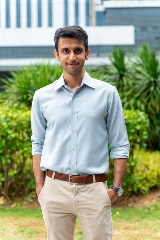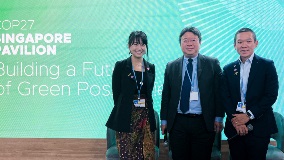NUS alumni Preston Wong ('13) and Kenneth Ham ('17) shared their journey creating food-saving app, treatsure.
 Can you guess how much food is thrown away in a year? The answer is shocking. Singapore households discard food that is equivalent to 68.4 million plates of nasi lemak, according to a 2019 Singapore Environment Council study.
Can you guess how much food is thrown away in a year? The answer is shocking. Singapore households discard food that is equivalent to 68.4 million plates of nasi lemak, according to a 2019 Singapore Environment Council study.
Taken aback by the copious amount of food wastage, NUS alumni Mr Preston Wong (’13) and Mr Kenneth Ham (’17) were spurred into action. They created the food-saving app, treatsure. The goal is simple — connect everyday consumers to surplus and sustainable food sources.
At a recent virtual talk, titled “Food Paradise vs Food Paradigms: The Emergence of Food Sustainability in Singapore”, the co-founders talked about combating food waste as a business and as an industry. The talk is part of the Bukit Timah Homecoming 2021, organised by NUS Office of Alumni Relations, and co-hosted by the NUS Faculty of Law and the NUS Lee Kuan Yew School of Public Policy.
For Mr Wong, a moment of serendipity led to this business of sustainability. Witnessing his family members clearing expired food from the refrigerator, he had an idea: “Perhaps one day we could build something to actually connect people with the excess food. People who would treasure them,” he expressed.
That food for thought was the perfect ingredient for the treatsure app. Launched in 2017, the eco e-commerce app allows consumers to order perfectly edible food, which might have otherwise gone to waste.
The entrepreneurs embarked on their journey at the NUS base for start-ups at The Hangar by NUS Enterprise. The duo decided to go upstream and target businesses.
“It's not just a socio-environmental issue; it’s also a business problem. Food waste comes from non-households, distributors and importers, stretching all the way to central kitchens and farms,” Mr Wong shared.
Back then, food redistribution efforts were largely driven by non-profit distribution groups, such as The Food Bank and Food from the Heart. Mr Wong elaborated: “Corporate businesses wouldn't actually just sell their food. Some would do CSR and give away to the needy. But the majority of them would find it very difficult to do so, because of liability issues, logistics and manpower.”
They identified a gap in the market, and made it easy for businesses to adopt food sustainability measures. Tapping on the network of the NUS Business School Global Alumni Network Office, treatsure was able to connect with industry players and experts in the field.
Appetite for their app burgeoned. Today, the start-up’s partners range from hotels such as Grand Hyatt and consumer goods conglomerate, Unilever, to wholesaler, Ban Choon Marketing.
Consumers can settle grocery shopping or lunch on the app. The selection includes slightly blemished fruits, expiring potato chips, and excess bread. Prior to the heightened pandemic alert, consumers could pack food from buffet restaurants in the last 30-60 minutes of each mealtime across the day.
Since 2017, treatsure has saved over 20 tonnes of food. Some of treatsure’s industry partners have reported a reduction of 30 percent in food waste. Buoyed by the success, the co-founders believe they can go even further.
Mr Ham has observed the rise of new surplus food sharing platforms, urban farming and smart solutions to tackle food wastage worldwide. He said: “Many are turning to technology to mitigate the challenges. Rising awareness towards zero waste is contributing to the sustainability ecosystem.”
While the pandemic has brought about fresh challenges, like disruption in food supply chains, the crisis has also brought about fresh perspectives.
“Businesses are rethinking whether they could actually reduce waste, and optimise efficiency and cost savings. This is a benefit which came out of the COVID-19 pandemic, because we are forced to rethink the way we do things, and how we can help to contribute towards sustainability,” Mr Wong elaborated.
If you are hungry for change, you can do your part too. The co-founders shared how to reduce food waste at home. For instance, one should plan grocery shopping based on needs, and not overbuy.
At the same time, you can give imperfect food a second chance. Mr Wong said: “‘Best Before’ doesn’t mean the food has expired. You should always judge and discern if the food is acceptable, as long as it passes the taste test, the smell test, and a visual test if there is no mould. The ‘Best Before’ date just means that this product is in its best state before that date.”
The next time your potato chips lose their crunch, try this pro tip shared by Mr Wong: “You can resurrect less crispy chips by popping them into a microwave oven for 30 seconds, and they will crisp up immediately.”
Living with small imperfections in food can create the perfect sustainability journey.






